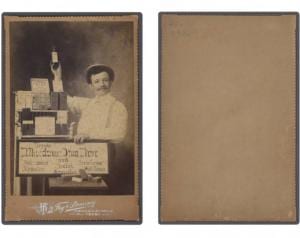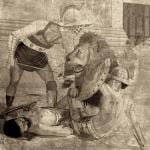Before he became a Christian, a relative was a shill for a patent-medicine man. As a good looking, bright young man his job was to hear the pitch and then say from the back of the audience: “I will take one.” That got the buying going. When he became a Christian, that, like a lot of other things, had to go. Persuasion should come from clear thinking and a clean heart!
Beware rhetoric without a love of wisdom. The sage Plato saw education in his city reduced to teaching the young how to make a bad cause look good through fancy talk. These glib men knew how to sell the snake oil, a medicine for soothing the pains from Athenian decadence, but not how to find the truth that could have saved the city. In fact, their sophistical teachers, highly credentialed, very bright, made sure they had no interest in the truth, since a search for truth would make persuasion more difficult.
The city was in pain, they gave her opiates, but nothing to cure the disease. A rhetoricians without a love of wisdom is an anesthesiologist without a surgeon.
To be able to speak persuasively, to create powerful media presentations, to know how to convince can be a superpower used to spread justice. In slave-state Athens in her declining years, demagogues loaded with rhetoric persuaded the city-state, convinced of her own goodness, to massacre anyone in the way of her imperial ambitions.
This should be obvious, but a misuse of persuasion is tricksy. Some words, truths, are not convenient. If spoken to the insiders, the people with power, or the people whose approval we covet, these truths might isolate us. (Phaedrus 276 E) If we love wisdom, then if we have nobility of soul, we will pursue noble truths no matter what happens to us.
That sounds brave, but done correctly, by the rhetorical person can have a certain intellectual cachet. Our souls, so cowardly, so afraid, can be careful in our opposition. Athens would accept the “hard words” of the Sophists, because they stayed away from the deepest problems and stuck to abstractions. What was impossible for the Sophists was the charity toward any sincere seeker that the true lover of wisdom will posses. (Phaedrus 269 E)
The rhetorician can become the house critic of the powerful, the cosseted Walter Duranty for Stalin, winning a Pulitzer, or Socrates who goes too far and dies. His own internal rhetoric, deployed to salve his own inflamed conscience, will look to a few hard, critical words and not see how he has become a useful idiot for evil. The lover of wisdom does not try to improve the snake oil, he stops helping the snake oil salesman.
He walks away.
When we hear a good argument, are persuaded, and so get a glimpse of beauty, perhaps we could help others if we testified to that power of wisdom: “I will take wisdom!” That is what my relative did, turning from shilling snake oil, to seeing the True Light. He testified boldly to that Light and the power of the Truth the rest of his days regardless of the cost.
May that be said of us all.
From a devotional given at a High Tea at The College program at The Saint Constantine School.














